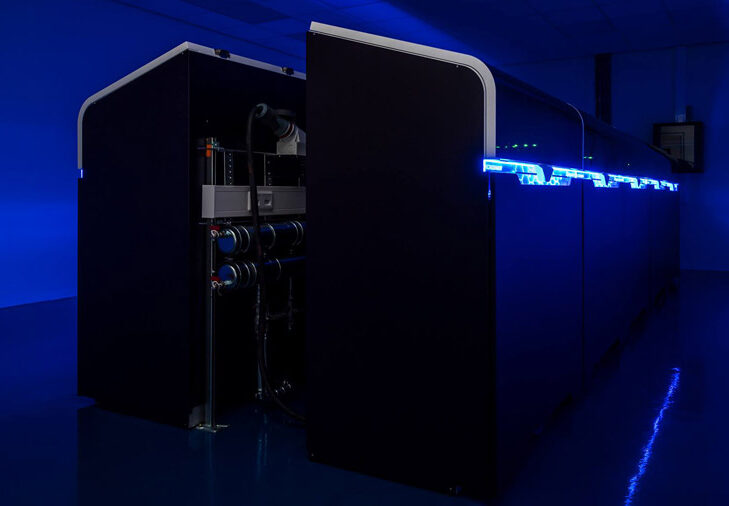
Shell and Asperitas announce bespoke immersion cooling fluid for data centers
Immersion cooling has gained eminence across a variety of industries where heat dispersion is critically important. In many such industries, conventional or active cooling methods are either too costly or inefficient at removing the volume of heat generated.
Data centers consume an inordinate amount of energy in a low-efficient manner. As the power density of data centers continues to expand, operators are under increasing pressure to reduce energy consumption – encouraging some to adopt immersion cooling solutions where information technology (IT) hardware is submerged directly into non-conductive dielectric liquids. This cooling method ensures temperature fluctuations remain negligible and reduces the potential stress of thermal expansion on micro-electronics — which can cause degradation over time.
Immersion cooling of data centers offers improved energy efficiency, plus a reduction in the physical space required for cooling equipment and IT infrastructure. Importantly, immersion cooling also enables considerable cost savings. The cost of cooling has been assessed at 40% of a data center’s energy consumption. Savings in energy usage from immersion cooling have been estimated at more than 60%, with some analysts claiming they can reach 95% in certain applications.
The Open Compute Project (OCP) Virtual Summit was held on 12-15 May 2020, following an earlier postponement of the physical event due to the Covid-19 health crisis. During the summit, international oil major Shell and immersion cooling specialist Asperitas announced the launch of a new bespoke fluid for immersion cooling — Shell Immersion Cooling Fluid S5 X. The new product was revealed during an Asperitas presentation alongside the revelation of a new liquid immersion cooling platform, the AIC24 21”, to complement their existing portfolio.
Shell Immersion Cooling Fluid S5 X is optimised for Asperitas’ natural-convection-driven immersion cooling solutions, though Shell has confirmed the product is compatible with forced circulation cooling systems used in alternative data centers.
Asperitas is a Dutch clean and high-tech scale-up. Since 2014, the company has been developing immersion cooling technology to enable the sustainable operation of high-density data centers. The idea was conceptualised by executives while exploring the world on a sailing ship and began with an initial focus on modular data centers within the maritime industry. The idea quickly evolved into a more general application of the technology.

The company’s enclosures house horizontal server racks filled with dielectric coolant that circulate by way of natural convection via gravity and thermal expansion of the oil. The products negate the need for server fans, air handlers and chillers, and the heat from the system can be recycled for alternative applications such as heating. Customers of Asperitas immersed computing technology in Europe include Vienna Scientific Cluster in Austria, 2CRSI in France and EcoRacks in Eindhoven.
Asperitas attracted investment from Shell Ventures, the corporate investment arm of Shell, in 2019, to support the acceleration of the company’s technology. The tie-up marked the beginning of a long-term strategic partnership that includes the development of liquids for Asperitas technology.
Shell’s synthetic, single-phase immersion cooling fluid was designed in partnership with Asperitas to deliver high cooling efficiency, excellent flow behaviour as well as thermodynamic properties. The company claims lower manufacturing costs than competitive products such as fluorocarbons and intensely engineered fluids.
Shell Immersion Cooling Fluid S5 X is produced using gas-to-liquids (GTL) technology, a technology that transforms natural gas into high-quality liquid products that would otherwise be produced using crude oil. Natural gas is the cleanest burning fossil fuel and enables a reduction in carbon dioxide emissions. In a statement, Eduardo de Azevedo, Shell product application specialist for immersion cooling fluids, noted that “our gas-to-liquids technology is a sustainable alternative for the immersion cooling industry.”
 Demand for “big data” is booming and will only increase coinciding with increasing demands on data infrastructure and systems. The immersion cooling market is expected to grow significantly due to rising chip and server rack density, and pressure to reduce energy usage. The global immersion cooling market has been projected to increase from USD177 million in 2019 to USD501 million by 2024, at a compound annual growth rate (CAGR) of 23.2%.
Demand for “big data” is booming and will only increase coinciding with increasing demands on data infrastructure and systems. The immersion cooling market is expected to grow significantly due to rising chip and server rack density, and pressure to reduce energy usage. The global immersion cooling market has been projected to increase from USD177 million in 2019 to USD501 million by 2024, at a compound annual growth rate (CAGR) of 23.2%.
The synthetic oil segment is expected to achieve the highest CAGR in terms of value. A transition to synthetic oils — due to a combination of lower costs, material compatibility and long life — has impacted the growth of mineral oils in this market.
North America is expected to account for the largest share of the immersion cooling market in 2019 (31.1%), due to the size and scale of data centers in the region, followed closely by Asia-Pacific which is experiencing increasing demand for immersion cooling solutions via growth technologies such as high-performance computing, artificial intelligence, cryptocurrency mining, and enterprise computing. A CAGR of 27.5% to 2024 has been projected for the Asia-Pacific region.
There are two types of immersion-cooled approaches. In a two-phase cooling system, the fluid has a low boiling point causing a phase change from liquid to gas. The vapour is condensed back to liquid form by water-cooled condenser coils. Single-phase cooling transfers heat to a coolant via direct contact, but it remains in liquid form and does not boil off. The fluid is cooled via a heat exchanger in a cooling distribution unit. The expectation is that single-phase immersion cooling demand will continue to grow at the expense of two-phase cooling — due to simplicity, affordability and lower maintenance requirements.







